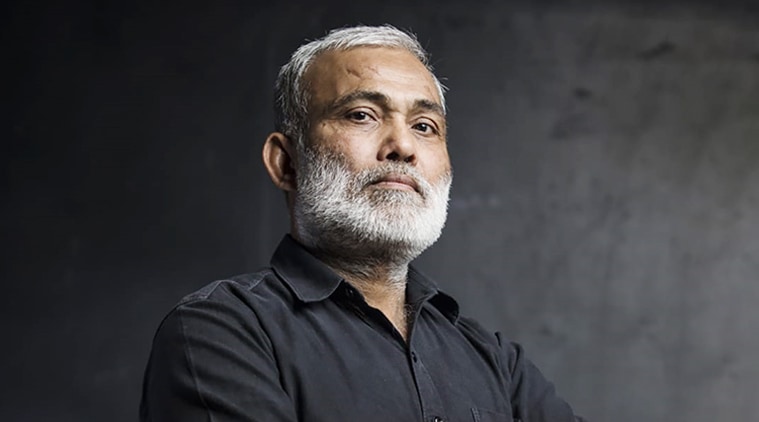 Arvind Gaur, an activist whose drama shows people caught in situations of conflict, decided that the pandemic will not stop theatre. (Photo: Asmita Theatre)
Arvind Gaur, an activist whose drama shows people caught in situations of conflict, decided that the pandemic will not stop theatre. (Photo: Asmita Theatre)
A bundle of papers on the table of theatre director Arvind Gaur gives a glimpse of the future. It is covered with designs that Gaur has been creating since the ‘Unlock’ began. “We are waiting for the government to announce that cultural activities are ready to commence. Within a week, we will put out our shows,” he says over the phone.
The sketches — among the first from India — are of how theatre will look until a vaccine comes out. The auditorium is a small studio and chairs for the audiences, strategically placed, are few and far. The opening plays on the roster are solos and the performance space is behind a sheet of transparent plastic. “We have prepared ourselves so that we can go on stage while following all protocol and medical guidelines,” says Gaur.
Major theatres across the world have responded to the pandemic by turning silent and dark, laying off staff or cancelling plays for the year. Gaur, an activist whose drama shows people caught in situations of conflict, decided that the pandemic will not stop theatre. “There might be a lockdown but not for our culture. Our target was that audiences remain connected with our plays and our activity also continues full-time. Right from the first day of the lockdown, we started the online ‘Quarantine Theatre Festival’ with a recording of a play, based on the stories of Bhisham Sahni, titled Amritsar Aa Gaya,” he says.
The National Theatre of the UK and the Bolshoi in Russia are among the organisations that led the online streaming of plays globally. Asmita was one of the first theatre companies to exploit the digital medium in India. Amritsar Aa Gaya shows how social, political and religious events affect human emotions and relationships. “It also touches on those individual struggles of life that everyone goes through, and how people react to them,” says Gaur. More than six lakh people in several countries watched Amritsar Aa Gaya.
Asmita has been streaming a play every evening for 130 days — a mixed platter of the legal drama Court Martial, the discourse of two founding fathers, Ambedkar Aur Gandhi, and Aruna’s Story, a solo of Lushin Dubey based on Pinki Virani ’s book on the nurse Aruna Shanbaug , who was raped and in semi-coma for 42 years. “Our group has worked through many disasters, from earthquakes in Nepal and Uttarakhand to communal riots in Delhi but we have never faced anything like the coronavirus. All we were asking ourselves was, “How do we overcome this challenge?. Every day, we took a step forward,’” says Gaur.
Asmita is a young group that is restless to do something great. Almost 100 college students and amateur actors undergo a tough regimen of training and discipline that includes performing street plays through the day in marginalised areas of Delhi. Dressed n black, the actors have been a part of the anti-corruption movement, labour movements and the Nirbhaya protests, among others. They have been jailed or hospitalised but the theatre has never stopped.
“Asmita’s tradition lies in theatre for society to create awareness and change. During the pandemic, basic issues did not go away. Domestic violence, patriarchy, discrimination and all kinds of hate were simmering in our society. People had time to watch shows so we streamed our nukkad natak on these issues. Our play on mental health, titled Main (Myself), received 3.5 lakh views,” says Gaur.
His home turned into a workspace with his daughter, actor Kakoli Gaur, working through the night to edit old recordings of plays from CDs for the next day’s broadcast. The group has a repertoire of almost 50 major stage productions and 100 street plays. On the ground, teams led by actors Ashish Sejwal, Prabhakar Pandey, Rahul Khanna, Amit Tiwari and Sahil Mukhi attended to callers on their artistes’ helpline and carried out relief work. “Artists did not have a source of income during COVID-19. We received calls from actors, puppeteers, dancers and a few painters. Our promise was to reach them with relief material within 12 hours through our wide network of performers and well-wishers,” says Gaur. A typical ration bag contained 5 kg rice, 4 kg dal, aata, vegetable, packets of spices,, sugar and oil, among others. The group also conducted workshops for school-children and a collegiate theatre festival.
Gaur, who used to be technologically challenged, worked with his other daughter, also an actor, Savereeshri Gaur, to understand the ways of Zoom. Now, he conducts online training for actors in movement, performance, speech and diction.“I have learned a lot during this period. COVID 19 has changed the pyramid of our beliefs and this will alter the content of our theatre and our lives. The world is standing at zero and we have to create ourselves all over again,” says Gaur.